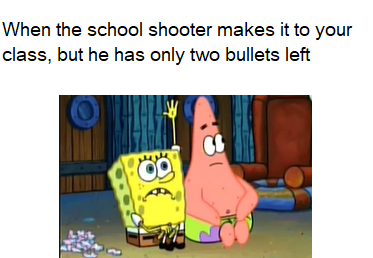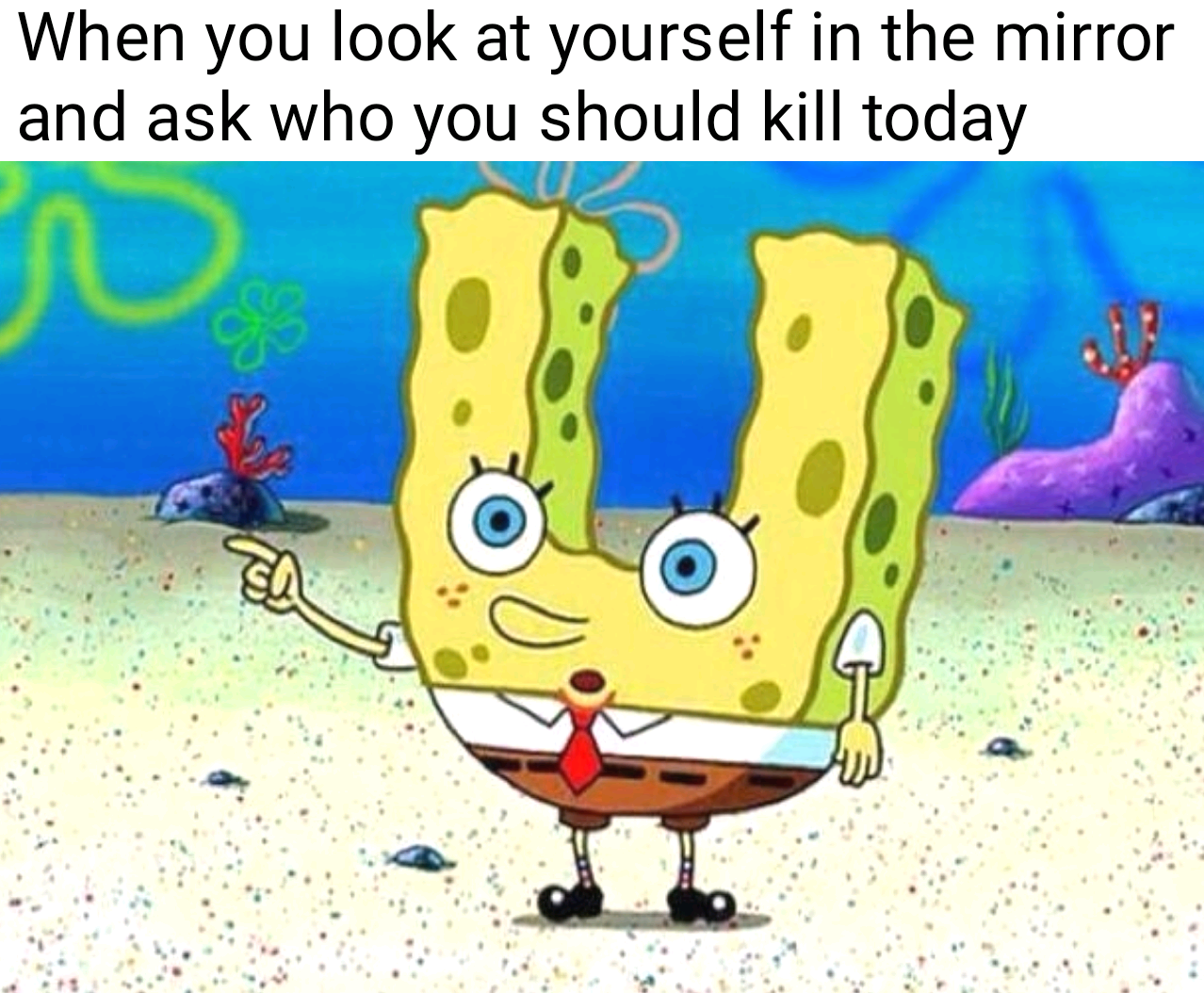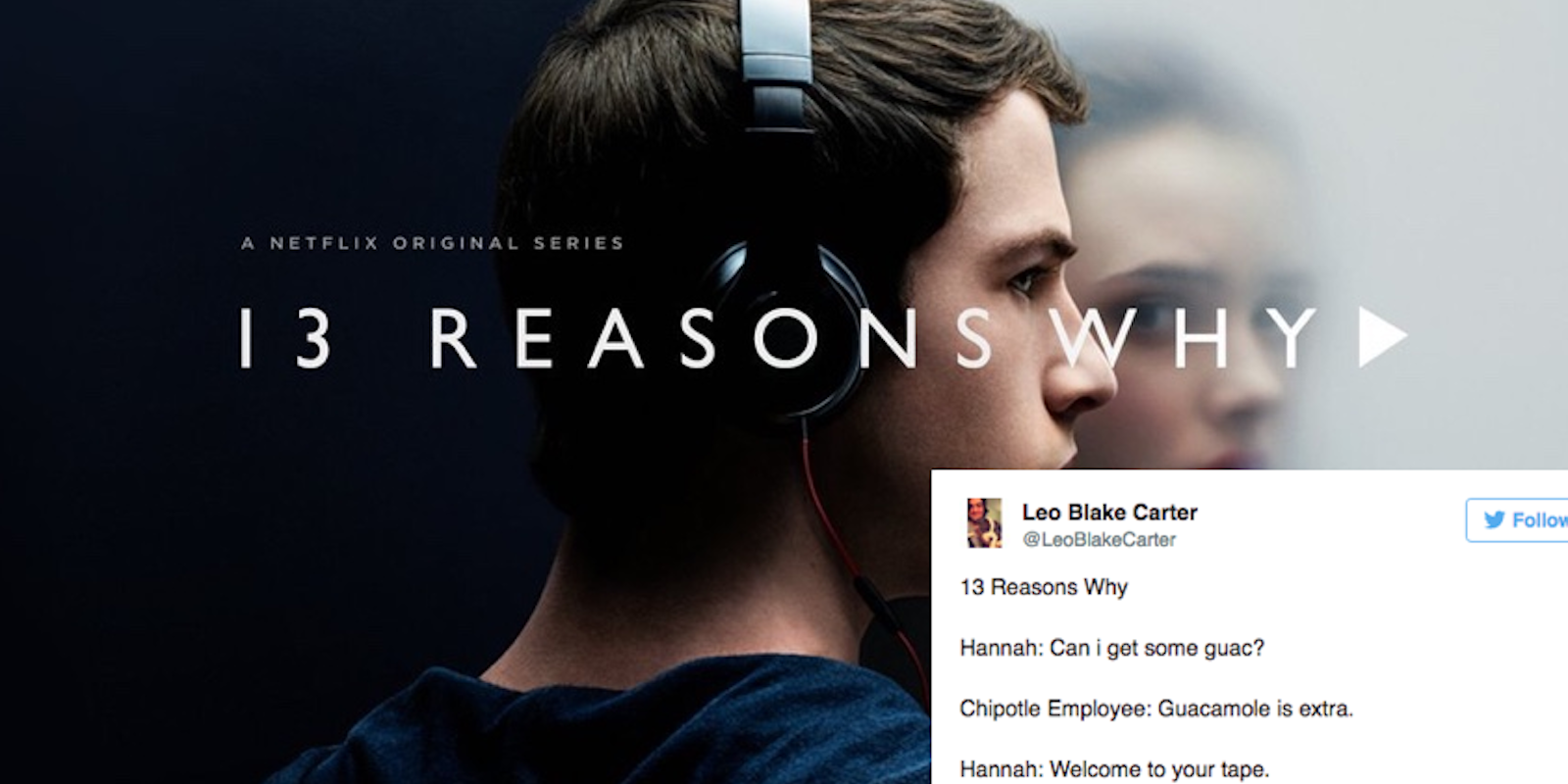Earlier this week, video streaming service Netflix burned its rival, Hulu, on Twitter with the line “Welcome to your tape.” It’s a reference to the Netflix series 13 Reasons Why, whose central character, Hannah Baker, has committed suicide and has left behind taped messages for everyone she blames for her death. And now “Welcome to your tape” is also a popular, but very problematic, meme.
Welcome to your tape https://t.co/juAMcd0jjU
— Netflix (@netflix) April 18, 2017
In the show, Hannah uses the expression to welcome each of the culpable parties to the story of what they did to her. But online, it’s become a joking way to indicate that something or someone makes you want to kill yourself. Usually, the circumstances are comedically trivial, and “welcome to your tape” is used in the same sense as the hyperbolic “fuck my life.” It could be that someone took your favorite ice cream flavors:
https://twitter.com/HuffMegan0491/status/855457861379514371
Or McDonald’s is out of shakes:
Hannah Baker: Can I get a milkshake?
McDonald’s: Sorry out machine is broken
Hannah Baker: Welcome to your tape
#13ReasonsWhy— Trending Tweets (@trendy__tweets) April 20, 2017
Or that the guacamole costs extra:
https://twitter.com/LeoBlakeCarter/status/853497485360340992
Or you don’t have a pencil when you need one:
https://twitter.com/tbhjuststop/status/854137460229632006
Or that the British prime minister has moved to trigger Brexit. (To be fair, that one’s more than just a minor inconvenience.)
Theresa May, 11:15am:
Britain, welcome to your tape. pic.twitter.com/k7jvWj68ov— Josh Baldwin (@Josh__B_xx) April 18, 2017
There’s even a popular meme image of Hannah Baker as internet-famous chef Salt Bae, just sprinkling tapes on people left and right:
https://twitter.com/13ReasonsShow/status/853383523620671488
It’s not always about exaggerating minor disappointments, though. It’s also being used to joke about the very recent real-life suicide of former NFL player (and convicted murderer) Aaron Hernandez, with this tweet blaming Hernandez’s death on Patriots quarterback Tom Brady:
https://twitter.com/_jhoeup/status/854746643828281345
But references to suicide, no matter how obviously they’re exaggerated, are a step beyond merely saying “fuck my life.” For many, the “welcome to your tape” jokes are beyond the pale, and possibly even dangerous.
https://twitter.com/MORBlDlTY666/status/852495748910460929
STOP !! POSTING !! WELCOME !! TO !! YOUR !! TAPE !! MEMES !! it’s disrespectful !! depression and suicide aren’t funny !!
— em 🪩 (@ootwclean) April 16, 2017
Some mental health professionals have even called the show itself “risky” and suggested it could lead to an increase in teen suicides, so it’s not surprising that people believe the jokes aren’t helping.
But jokes about suicide and depression, for better or worse, are a longstanding and inextricable part of meme culture. There’s a whole genre of memes, especially popular on Reddit, where the punchline is that the poster wants to die. Here’s a small sampling from this week alone:




There appear to be two main drivers behind this phenomenon. One is that the culture of meme incubators like 4chan and Reddit tends toward offensive jokes and a general opposition to “political correctness.” It’s an environment where young men act like “edgelords” and enjoy seeing what taboos they can get away with breaking. Joking about suicide is hardly shocking in the underbelly of meme culture, where racism and “Hitler did nothing wrong” jokes are part of a balanced diet.
The second, more interesting motivation is that there’s a little bit of truth in jokes. Now that memes have evolved into a primary means of self-expression online, it’s natural to use them to broach difficult topics, like depression, that would otherwise be difficult to bring up. The communication is sometimes stilted, and viewed from outside meme culture, these suicide references look crass. But for some of the people making the memes, what appear to be a bunch of dumb Spongebob and Star Wars images might be a valuable way of putting themselves out there and finding they’re not alone in their feelings.
Most of the “welcome to your tape” jokes are something else, though. Rather than commiserating about life with depression and suicidal thoughts, they’re more about wildly overreacting to everyday situations. Sure, overreactions can be funny, but the jokes also carry the troubling implication that people who take their own lives are just being dramatic. That’s the opposite of what 13 Reasons Why intended. The show’s creator, Brian Yorkey, has said he tried to be “very clear that there is nothing, in any way, worthwhile about suicide.”
anyone who makes “welcome to your tape” jokes completely missed the entire point of the show
— naya (@bowlofbl00d) April 21, 2017
If you think the Welcome To Your Tape jokes and memes are funny then you missed the entire point of 13 Reasons Why
— sarai (@Sarairai621) April 20, 2017
There are some who argue, though, that the “welcome to the tape” meme is proof that the show failed in its treatment of suicide, inadvertently glamorizing it and branding it with a catchphrase.
I understand what 13rw was trying 2 accomplish but I don’t think it worked considering the amount of “welcome to your tape” jokes I’ve heard
— bday figgy (@armzbendback) April 20, 2017
https://twitter.com/e_wicz/status/854895020561793024
https://twitter.com/Ieahwh/status/855510805206495232
https://twitter.com/Ieahwh/status/855510857333256192
https://twitter.com/atinylittleking/status/854745312946077696
https://twitter.com/JWilliams2729/status/855267044044017665
It is possible, however, to understand the problems with the “welcome to your tape” jokes—or even be suicidal yourself—and still find them funny. Although most people talking about the meme on Twitter have come out as strongly pro- or anti-, a smaller group has found they feel a little bit of both:
brb trying to reconcile my hatred of 13 reasons why and my love of these “welcome to your tape” jokes
— anna borges (@annabroges) April 18, 2017
https://twitter.com/SepticHailey/status/855328212334682112
https://twitter.com/justcharissa/status/855435828448964610
It seems the only consensus about this meme is that it’s a huge cultural phenomenon. 13 Reasons Why is already the most-tweeted-about original show in Netflix history—the jokes certainly contributed to that, but they’re also a byproduct of the show’s popularity. As much as people like to hem and haw about the death of old media, TV is still one of the most powerful forces in internet culture, and repeating TV quotes is still a reliable substitute for a sense of humor. It’s inevitable that any repeated phrase that anchors a major show will become a meme, no matter how dark the context.
For more information about suicide prevention or to speak with someone confidentially, contact the National Suicide Prevention Lifeline (U.S.) or Samaritans (U.K.).


